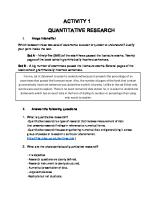Quantitative Research [PDF]
QUANTITATIVE RESEARCH Definition of Quantitative Research Expressions like numerical forms, objective thinking, statisti
56 0 61KB
Papiere empfehlen
![Quantitative Research [PDF]](https://vdoc.tips/img/200x200/quantitative-research-d64eca1e61f164.jpg)
- Author / Uploaded
- Leonarda Bagtindon Licayan
Datei wird geladen, bitte warten...
Zitiervorschau
QUANTITATIVE RESEARCH Definition of Quantitative Research Expressions like numerical forms, objective thinking, statistical methods, and measurement signal the existence of quantitative research. One word that reflects the true nature of this type of research is numerical. This term, numerical, is a descriptive word pertaining to or denoting a number or symbol to express how many, how much, or what rank things are or have in this world. Expressing meaning through numerals or a set of symbols indicates specificity, particularity, or exactness of something. Quantitative research makes you focus your mind on specific things by means of statistics that involve collection and study of numerical data. Thus, to give the basic meaning of quantitative research is to say that research is a way of making any phenomenon or any sensory experience clearer or more meaningful by gathering and examining facts and information about such person, thing, place, or event appealing to your senses. You use mathematical operations of addition, subtraction, division, and multiplication to study and express relationships between quantities or magnitudes shown by numbers or symbols. Involving measurements and amounts, quantitative research seeks to find answers to questions starting with how many, how much, how long, to what extent, and the like. Answers to these questions come in numerals, percentages, and fractions, among others. (Suter 2012; Russell 2013) Characteristics Since quantitative research uses numbers and figures to denote a particular thing, this kind of research requires you to focus your full attention on the object of your study. Doing this, you tend to exclude your own thoughts and feelings about the subject or object. Therefore, quantitative research is described as objective research in contrast to qualitative research that is subjective. Characterized by objectiveness, in which only the real or factual, not the emotional or cognitive existence of the object matters greatly to the artist, quantitative research is analogous to scientific or experimental thinking. In this case, you just do not identify problems but theorize, hypothesize, analyze, infer, and create as well. Quantitative research usually happens in hard sciences like physics, chemistry, biology, and medicine; qualitative research, in soft sciences such as humanities, social sciences, education, and psychology, among others. Classification Quantitative research is of two kinds: experimental and non-experimental. Each of these has subtypes. Falling under experimental are these specific types: true experimental, quasi-experimental, single subject, and pre-experimental. Quasi-experimental comes in several types such as: matched comparative group, time series, and counterbalanced quasi-experimental. Non-experimental research, on the other hand, has these sub-types: survey, historical, observational, correlational, descriptive, and comparative research. Importance The importance of quantitative research lies greatly in the production of results that should reflect precise measurement and an in-depth analysis of data. It is also useful in obtaining an objective understanding of people, things, places, and events in this world; meaning, attaching accurate or exact meanings to objects or subjects, rather than inflated meanings resulting from the researcher’s bias or personal attachment to things related to the research. Requiring the use of reliable measurement instruments or statistical methods, a quantitative study enables people to study their surroundings as objective as they can. This kind of research is likewise an effective method to obtain information about specified personality traits of a group member or of the group as regards the extent of the relationship of their characteristics and the reason behind the instability of some people’s characteristics. (Muijs 2011; Gray 2012)
QUANTITATIVE RESEARCH PROBLEM Nature of Quantitative Research Problem Life is not always a bed of roses. It is made up of both negative and positive aspects of life. Experiencing something negative or making you fail to aver or affirm the existence of a thing you expected to see or happen is a natural occurrence in life. This situation in life, where you find difficulty in knowing or finding answers or solutions to questions causing you worries or perplexities is called a problem. By nature, you or any person on earth do not want to stay long in a problematic kind of life. Once you encounter a problem, being an inquisitive, speculative, and creative person, you immediately would like to find ways and means to free yourself from such conundrum in your life. Sparked by your curiosity or interest, you get to ponder on a problem needing answers. You resort to thinking of what to solve, whom to ask, where to go, and how to do all the things you want to happen to find the answer to the problem. Behaving this way, you are then confronted with a research problem. A research problem is something that nurtures in your mind a difficulty or uncertainty, enough to push you to do an empirical investigation whereby you search for answers to a problem by collecting and analyzing data or information through which you can find the right answer or solution. Requiring you to adopt an empirical attitude toward your problem in a way that you depend on your sensory experience, conduct experimentation, or perform a scientific method in arriving at the truth about something makes your problem a researchable problem. Being researchable, your research problem becomes a Quantitative Research Problem, not a qualitative research problem that people consider not researchable because it is more inclined to explaining or describing people’s views, values, attitudes, opinions, and other subjective traits. Unlike a quantitative research problem that is not only characterized by precision, specificity, or stability, but also geared toward a possible result, qualitative research problem is described as expansive, widespread, and developing and it is focused more on processes rather than on outcomes. (Matthews 2010; Schreiber 2012)









